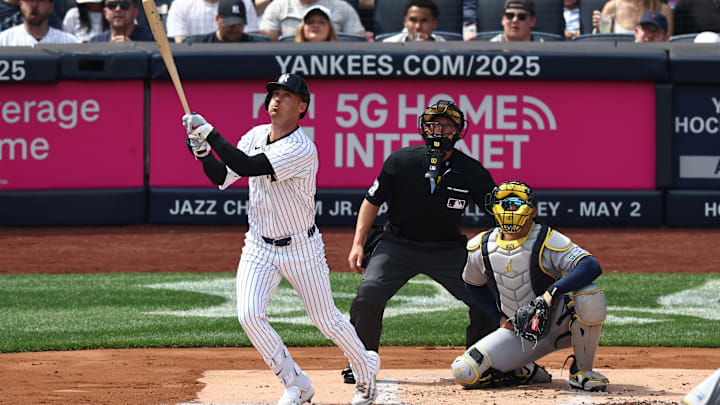During the first weekend of the MLB season, the New York Yankees showed off their No. 1 differentiator from the NL Central's metronome, the Milwaukee Brewers, by flexing their power stroke. Over the weeks that have followed, though, Milwaukee has shown some of the "Tortiose and the Hare"-inspired attributes that have made them a playoff stalwart, chipping away at the Yankees' early edge by showing off the ways that they shine.
Ironically, in terms of both personnel and the world of the personal, the Brewers have displayed a few different edges over the Yankees, striding forward in almost polar opposite fashion.
Every time the Yankees play the Cleveland Guardians, a certain sect of the fan base inevitably chimes in to say that the Guards play small ball at an expert level, and the Yankees should learn a little somethin' about how to bunt and run, rather than strike out, from their AL Central rivals. While that's technically true — it's obviously better to score than whiff! — that chatter gets real quiet when the Yankees drill four homers and bludgeon Cleveland, as they did during last year's ALCS.
On a deeper level, what Milwaukee is doing differently than the Yankees could have a wider-reaching impact. Over the weekend, gruff (but learned) manager Pat Murphy pulled two young stars from a game — Sal Frelick and familiar face Caleb Durbin — for nominal baseball offenses. Frelick missed the cutoff man; Durbin was foolishly picked off straying too far from the bag.
Murphy didn't wait for the 12th offense to make a move. He didn't blow the offense out of proportion. And, yes, he has the benefit of playing outside New York's pressure cooker. But ... he taught his players a lesson. He did it once. And now the line in the sand has been drawn. The Yankees haven't exactly fostered a similar environment of consequences in recent years, and it bit them repeatedly last October.
Reading some notes for talkin’ baseball tmrw
— Talkin’ Jake (@TalkinJake) April 28, 2025
Can you imagine if you got benched on the ‘24 Yanks for missing a cut off or bad baserunning? pic.twitter.com/XaefAVp0It
Yankees should manage sloppy play, bullpen the way the Milwaukee Brewers do
Of course, we don't know if Frelick's or Durbin's sloppy play will stop on a dime. It's all theoretical. The Yankees may also be too far into their current way of doing things to reverse course now.
But one tangible tweak to the Yankees' processes, based on the Brewers' first month of the season, involves the way the two teams handle the closer's role.
Milwaukee, forced to operate on a midwestern middle-market team's budget, has learned their lesson well: develop a star closer, but have a succession plan. This offseason, the Yankees saw what they had in Luke Weaver, one year away from a likely substantial payday, and ... cut the line once again, surrendering assets for Devin Williams, the All-Star trending downward who the Brewers felt it was time to get rid of.
The Brewers might've traded Luke Weaver this offseason if they were running the Yankees; that, given the Yankees' payroll and planning, would've been a mistake without a bonafide No. 2. But what Milwaukee certainly wouldn't have done? Add another expensive walk year closer without also training a long-term solution.
Milwaukee didn't know Williams would start off this poorly, but if he had remained their problem, they would've had fellow changeup artist Craig Yoho ready and willing to take his mantle; Yoho has allowed one run in 3 2/3 innings thus far after his promotion from Triple-A. The Yankees took a page out of Milwaukee's book and proactively removed Williams before the ledger of his offenses grew even longer. What they didn't do was build a 2026 Plan B before pitting two expiring contracts against one another.
Perhaps the Brewers' house of cards will all fall apart again this October, while the Yankees power up the way they did in the season's first series, riding their torpedo bats to the promised land. For now, though, it seems the Yankees can learn two distinct stylistic lessons from the team they whomped to open the year, as Milwaukee crawls closer and closer to equaling New York's surge by the day.
